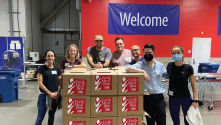Usman: The story of my education
by Usman Yousaf, Accounting Analyst
January 25, 2021

School in a Small Village in Azad Kashmir, Pakistan
Most American children share an initial schooling experience of entering a building with desks and chairs and a smiling teacher greeting them at the door. I began my academic journey learning my ABCs along the perimeter of an ugly, dirty piece of carpet under the bright blue sky. Rain or shine, we always attended school. Many times I can remember getting soaked during a rainstorm.
As time passed, we moved into a small mud building, which frequently leaked. This school was approximately two miles down the hill from my home. We had five subject areas, each of which required one textbook and one notebook. With the addition of a lunch box, our backpacks became quite heavy. We had not yet found chairs to use in class, so we sat on stones. When it snowed, we were required to shovel but would sometimes put sugar in the snow to make snow cream, or have snowball fights with one another.
It was common to attend this type of preschool before attending government-run schools. My parents and siblings decided I would go to a private school, which was considered somewhat better than the government-run schools. The school was approximately four miles down the hill from our home. At the age of six, I walked nearly two hours every day along the mountainside with my heavy backpack. Occasionally I would run to school because our teachers would beat us if we were late. The private school was much more strict but in better condition than the government-run schools. We would burn our old textbooks and notebooks to create heat during the winter. During our lunch breaks, we would collect wood for a fire.
Despite the hardships, I realize these teachers were the ones who provided me with the foundation to be able to write this today.
Conflict on the Way to School
My parents were uncompromising in the education of their children. In Pakistan, the education system is paid for on a cash-basis. My dad was the sole earner for our family and paid a fee each month for me and my four siblings.
The private school did not have grade levels. Students competed for something we called the “first position.” I remember receiving the first position one day, and all the people from my village attended the ceremony, whistling and making noise. Because I was the only one from my village to attend private school, it was exciting to everyone whenever I earned the first position. There were no phones at that time, so if I secured the first position, I would have to walk miles up the mountainside to tell my mom. She became more preoccupied with me acquiring first or second position than anything else.
Around this time, a conflict arose between two groups of villagers and they began fighting with one another. Almost everyone in our village was involved except my family. There were mornings when my siblings and I woke up for school to the sound of bullets firing. I would tell my mom that I should have the day off from school because of the fighting. She would dismiss me and walk me to school herself.
The fighting took place about halfway between my home and the school. Dodging bullets, my mom would reassure me that they would not kill us because they were fighting one another. One time a group stopped us and threatened that I should not travel the pathway again and that if I did, they would beat me up. My mom told them that our family had nothing to do with their dispute and to stay away from me or they would face the consequences. She was bluffing but thankfully they did not catch on.
As the fighting between the two groups of villagers became more intense, many families came up with different routes to and from school. The path I took was so dangerous that I do not think I would be able to go down it today. If my foot slipped, I would roll at least a mile down the hill.
Air Conditioner Room
My dad worked in an area near my school. There were several times I skipped class to help him carry luggage for his job. I lied to him, saying my class was free that day. If I did not lie to him, he would not let me help and would struggle alone. One day, when helping him pick up a large, heavy bag on his back, he said, “Son, the only way to get into the air conditioner room is through education.” He continued, saying, “I might not be able to give all of you good clothes, shoes, and so on, but I will make sure you get a good education.” He did not want us to engage in the hard labor he had endured out in the sun; instead, he wanted us to study and get a job in an office with an air conditioner. I had never seen one and did not fully understand him, but his words stuck with me for a long time.
Earned Opportunity
When it was my turn to attend college, I wanted to go to the city of Islamabad. However, with my mom’s health issues, my dad working extensive hours, my sister married, my eldest brother working abroad and my other two brothers in college, we decided I would go to a local college while simultaneously caring for my mom.
I did not give my best efforts to this local college. When it rained, it became difficult to sit in the classroom due to the smell from the rain mixing with dirt and animal manure. At that time I often wondered if my education would get me anywhere better in life. However, my mom believed differently. She always said, “Usman, you are doing this for me. It will not go to waste. One day you will be a successful man.”
After two years I graduated with a Bachelor’s of Commerce. I later moved to the city and gained admission into a certification program. The university I attended was cleaner and more expensive. I remained there for a year before receiving an opportunity to go to America.
An American Degree
After spending some time in America, I decided to pursue a Bachelor’s degree at a college in the US. But I knew I needed to find a stable job. Discouraged one afternoon, I found myself at a proverbial fork in the road. On the left was the office of an accountant and on the right was a bar. I did not know what I would say if I walked into the accountant’s office. I considered going to the bar to watch TV and brainstorm ideas. I decided to push my fear aside and walked into the office of Kenneth Desimone, CPA. I told him I was willing to work for free but wanted to learn from him. He agreed to the arrangement and taught me numerous accounting skills and life skills. One day, he gave me a $20 bill and told me to explore Beacon Street in downtown Boston. At the time, I had no idea that I was walking by the building in which I would soon work.
As the youngest son of two Kashmiri villagers with no formal education of their own, I was proud to graduate with a Bachelor of Science in Business Management, magna cum laude, from Endicott College in the United States of America on May 21, 2016.
My Career
Shortly after graduating, I was offered a few good job opportunities. My mentor, Kenneth Desimone, encouraged me to take an accounting position at Boston Trust Walden, believing I would learn a lot there. Even though there were other tempting offers, I realize now that he could see something for me that I could not see for myself.
Thanks to the encouragement of my colleagues, I went back to school and earned a Master’s in Business Administration with a concentration in Finance on May 23, 2019. I was recently promoted to Accounting Analyst. I continue to educate myself and read as much as I can.
Today I work in an air conditioned office on a floor of a building that overlooks Boston Common. Every day I am reminded of my mom and dad who made it possible for me to obtain such a high quality education. It has been seven years since I hugged my dad and I long for the day we can be together again.
Life is work. To be happy and healthy, we must work. Although my parents may have struggled, they were successful in achieving their dreams for their children. And now, because of education, I am achieving mine.
Thank you Abu and Ammi (Dad and Mom).






